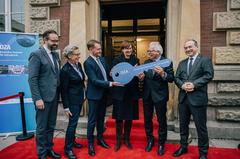URL: https://www.desy.de/news/news_search/index_eng.html
Breadcrumb Navigation
DESY News: The key to unlock our universe
News
News from the DESY research centre
The key to unlock our universe
Last week, the German Centre for Astrophysics (DZA) officially opened its interim location in the historic post office building on Postplatz in Görlitz. During the inauguration ceremony, Federal Research Minister Bettina Stark-Watzinger and Saxony's Minister President Michael Kretschmer symbolically handed over the key to the DZA's designated founding director, Günther Hasinger, Professor at the Technical University of Dresden and Senior Scientist at DESY.

Sebastian Gemkow, Science Minister of Saxony, Prof Ursula Staudinger, Rector of TU Dresden, Michael Kretschmer, Saxony’s Minister President, Bettina Stark-Watzinger, Federal Research Minister, Prof Günther Hasinger, DZA Founding Director, and Octavian Ursu, Mayor of Görlitz. (Photo: Paul Glaser)
The ceremony was attended by Saxony's Science Minister Sebastian Gemkow, the Rector of TU Dresden, Prof Ursula Staudinger, and the Mayor of Görlitz, Octavian Ursu. The offices in the historic post office building on Postplatz in Görlitz offer two floors of workspace for the centre's first approximately 100 employees before the DZA moves to its final locations in Görlitz and the district of Bautzen.
The panel discussion on the subject of "The German Centre for Astrophysics: A beacon for sustainable structural change in Upper Lusatia" was attended by Federal Minister Stark-Watzinger, Minister President Kretschmer, Science Minister Gemkow, Rector Staudinger and Hasinger. He emphasised that the DZA would not only advance astrophysics research, but also contribute to strengthening the regional economy and education. " There are many examples: astronomy research changes regions sustainably. With its unique combination of research and development in IT, sensor technology and materials research and its need for production facilities, the DZA will provide economic incentives and create at least 3,000 future-oriented jobs at the centre and in the surrounding area," explained Hasinger.
A presentation by Prof Uwe Cantner, Chairman of the Commission of Experts for Research and Innovation (EFI), on the topic of "Structural change through research" also addressed the framework conditions to be created by politics and society for the successful development of the DZA and rounded off the event.
After the event, the guests had the opportunity to visit the DZA's premises in the post office building, which are currently under construction. The move is planned for the beginning of March.
About DZA
With the German Centre for Astrophysics - Research. Technology. Digitisation. (DZA), a major national research centre with international appeal is being created that will push forward resource-saving digitization, develop new technologies, ensure transfer and create perspectives for the region - firmly rooted in Lusatia in Saxony. It is a joint initiative of German astronomy and astroparticle physics. The initiative includes many renowned scientists, with the support of the major German scientific organisations. The centre will be located in Görlitz and the district of Bautzen. After the start-up phase, annual funding of around €170 million is planned for the final stage of development, and the centre itself will employ more than 1000 people.
The DZA is currently in a start-up phase in which it is being funded as a project before it is to be established as a legally independent centre in 2026. During this start-up phase, TU Dresden is taking over the project organisation with the support of DESY.



